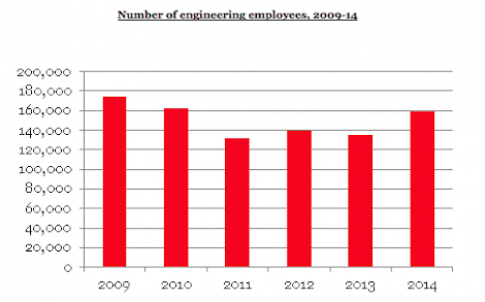We start the week with seemingly incongruous news regarding engineering job prospects and salaries.
The good news is that the number of engineering jobs is growing at its fastest rate since the financial crash but this is tempered by salaries that appear to have flat-lined.
These are the conclusions of research from Nixon Williams, which found that the number of engineering sector employees increased last year by 17.7 per cent to 159,000, which is 15,000 short of 2009’s total.
Nixon Williams, which provides accountancy services for contractors, note that despite the rise in job creation, real terms pay in the engineering sector is also below its 2009 peak.
They say that median annual pay in the engineering sector is currently £29,806, or two per cent higher than in 2009, when median annual pay stood at £29,222. In comparison, median annual pay in the IT sector is 2.6 per cent lower than its 2009 peak of £37,094 per annum.
In a statement issued today, Martin Brennan, practice manager of Nixon Williams, said: “The UK engineering sector has seen its strongest year of jobs growth since the recession and has cemented its status as one of the key drivers of economic output in recent years.

“Employers are increasingly reporting that a shortage of engineers is a threat to their growth plans and are struggling to find the skills they need in the marketplace.
“If the current rate of job creation is maintained, the size of the engineering workforce will exceed 2009 levels later this year. Despite the recovery in jobs, pay growth for engineers has been relatively subdued.
“We are seeing this phenomenon elsewhere in the economy where employers have opted to recruit graduates into entry level jobs and train them internally rather than recruit experienced, and often higher paid, candidates.”
The General Election is nearly upon us and some of you may have been wandering when investment in engineering (or indeed anything vaguely scientific and economically viable) was going to make it onto agenda.
Post-election talk in 2010 was focused around rebalancing the economy and figures released today by the CBI show continuing recovery in British manufacturing, albeit with a pace of growth that is showing signs of easing.
The good news is that you can find a myriad of prospective parliamentary candidates (PPC) discussing the importance of STEM and STEM careers on CaSE’s (Campaign for Science and Engineering) website.
CaSE invited PPCs to contribute written submissions on why science and engineering is important to the UK and how they would support this as an MP.
Over 100 PPCs responded from a range of political parties and their thoughts can be found here.
The Engineer weekly Poll for March 31, 2015 asked its readers which party has the best policies for the manufacturing sector and the Liberal Democrats prevailed with 45 per cent of the vote.
With that being so, this week’s Briefing ends with a quote from Lucy Care, the Liberal Democrat candidate for Derby North and herself an engineer: “We live in such an immensely interdependent world. Few people recognise how fragile our society is. The 2008 financial crash was in part triggered because neither banks nor regulators fully appreciated the degree of interdependence between institutions, and the way that problems could cascade through the system. As oil supplies failed to meet demand, prices rose dramatically.
“Rising costs for households and businesses started tipping the economy over the brink. People’s daily commute cost more. Shipping goods became more expensive. Homeowners started missing their mortgage payments. The ‘sub-prime’ market began collapsing, and the unwise redistribution of these debts through the banking system resulted in the crash.
“Do most people see the world with these layers upon layers of complexity? In my experience they do not. Scientists, and particularly engineers, are not only trained to understand the workings of one entity, but to see how this relates to many others. Change the timing on one set of traffic lights and a whole road network may snarl up. Reduce water flow by too much and a downstream ecosystem may collapse.
“I believe we need more people who can think like this at the top of organisations. We need people with the ability to identify the way that small factors in one area can make immense differences to the whole. It’s not only scientists, and particularly engineers, who think like this but in my experience they’re some of the best at it.”











UK Enters ‘Golden Age of Nuclear’
The delay (nearly 8 years) in getting approval for the Rolls-Royce SMR is most worrying. Signifies a torpid and expensive system that is quite onerous...